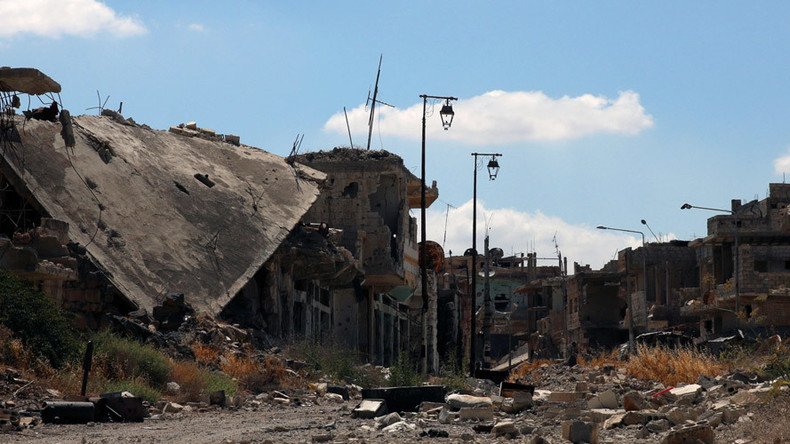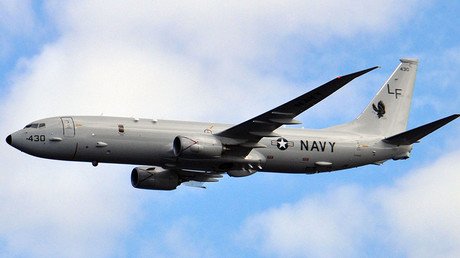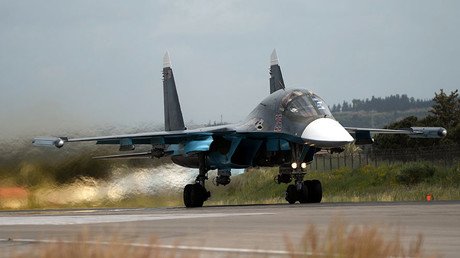US threats and actions in Syria are those of a rogue state

When Trump’s UN ambassador, Nikki Haley, asserts - as she did recently - that the US is sending “not only Assad” but also “Russia and Iran a message," and that Washington is putting them “on notice,” she does so as the tribune of a rogue state.
Haley issued her ‘warning’ on the back of the dubious claim, made recently, that Washington had intelligence confirming Syrian forces were preparing a chemical weapons attack. The claim and resulting threat revealed that the US continues to arrogate to itself the status of the world’s policeman, with the right to act as judge, jury, and – as the people of Afghanistan, Iraq, and Libya have learned to their disastrous cost in recent years – executioner. It describes arrogance beyond measure, conforming to the worldview of an empire whose guiding mantra is “Rome has spoken; the matter is finished."
Haley: 'Our priority is no longer to sit there and focus on getting Assad out,' https://t.co/hVKLBMO8CP
— RT America (@RT_America) June 28, 2017
The “matter” so far as Syria is concerned is regime change, which it becomes increasingly clear is Washington’s primary objective going forward, using its military campaign against ISIS as a stalking horse to justify the build-up of its military presence in the country with this in mind. Seen in this light, the recent spate of US attacks on Syrian forces on the ground and in the air takes on an entirely different connotation – i.e. less to do with protecting US-backed ground troops, as claimed, and more to do with testing Russia’s response and resolve when it comes to supporting its Syrian ally.
In the immediate and short term, the partition of Syria between east and west appears underway – at least if Washington has its way – evidenced by the recent visit to Syria by Brett McGurk of the US State Department. The stated purpose of his visit was to meet the “council planning to run Raqqa” after it is taken from ISIS. Thus here we have a US official visiting a sovereign state without the prior permission of said sovereign state’s legitimate government to discuss the administration of a part of its territory. This is imperialism by any other name, consonant with the actions of a country that is inebriated with that most potent of cocktails, unipolarity and might is right.
It is also no accident that the uptick in US military aggression in Syria, a country which, again, it is worth pointing out it has zero right to be in, has ensued in the wake of President Trump’s visit to the region in May, during which he enjoyed extensive talks with key US allies, Saudi Arabia and Israel. As everybody knows, King Salman and Benjamin Netanyahu are leaders who go to bed at night and wake up in the morning dreaming of destroying Iran as a regional power. With Trump likewise leaving no doubt of his administration’s enmity toward Iran, it doesn’t take a genius to discern the trajectory of events. It is a trajectory which confirms Riyadh’s recent and on-going aggression against Qatar was undertaken with Tehran rather than terrorism in mind, given the positive relations Qatar has long enjoyed with Iran, while Israel’s continued air and missile strikes against targets in Syria only confirm that rather than ISIS or Nusra, for Tel Aviv the enemy is Assad and Hezbollah, both of whom are fighting ISIS and Nusra.
READ MORE: What next? America waxes nostalgic for abusive Middle East autocracies
With the conflict in Syria entering its post-ISIS stage, the smoke has cleared to reveal that where Washington and its regional allies are concerned the road to Tehran runs through Damascus and southern Lebanon. What we have in the region, as a result, is the formation of two countervailing blocs - an axis of resistance and non-sectarianism comprising Syria, Hezbollah and Iran, which is supported by Russia, and an axis of regime change and sectarianism comprising Saudi Arabia and Israel, supported by the US. States such as Turkey and Egypt, meanwhile, have been oscillating between both, though their ability to continue doing so as tensions deepen further is doubtful.
What should be borne in mind when surveying these events is the fact that Washington’s determination to destabilize Syria and overthrow its government has not arrived out of nowhere. As far back as 2006 the US Embassy in Damascus was preparing and distributing a memo outlining ways to “exploit” the supposed weaknesses of the Syrian government. Then, too, we have Washington’s part in funding, training, and arming rebel groups that have been fighting Syrian government forces at various points throughout the conflict. In so doing it has only succeeded in prolonging the suffering of the Syrian people and providing succor to ISIS, Nusra, and various other Salafi-jihadi groups.
An important factor arising from these developments is the need to abandon any hope in the prospect of a resetting of relations between Russia and the US with Trump at the helm. Rather than any departure from the status quo, the current president is on course to achieving the onerous status of the status quo times ten where the assertion of US unipolarity is concerned. He is a man whose irrationality and caprice is only matched by his vanity and atrocious judgment. Whether the unleashing of illegal missile strikes based on unfounded allegations of chemical weapons attacks, or whether his withdrawal from the Paris Climate Change Agreement, the world finds itself dealing with an administration whose every decision is worse than the one preceding it.
As the conflict in Syria continues, two of its participants find themselves with a serious decision to make. Firstly the Kurds of the YPG, who make up the bulk of the US-backed SDF ground forces currently engaged in an operation to take Raqqa, need to decide if they are willing to be used as a proxy in service to Washington’s wider strategic objectives vis-à-vis direct confrontation with the Syrian government and Iran in the months ahead. In this respect, history confronts the Kurds and their supporters with the treachery that resides in Washington. In 1991 Bush Sr. and his administration encouraged them to rise against Saddam Hussein in Iraq at the end of the First Gulf War, only to abandon them to their fate in the event.
Secondly, and more crucially, Russia is being placed in an increasingly intolerable position by Washington and Israel with their increasing violation of Syrian sovereignty and attacks on pro-government forces. Up to this point, Moscow has been a model of restraint in the face of what are repeated provocations. How long it can afford to exercise such control is questionable, however. The harm to Russia’s security and national interests if the Assad government is forced from power by the aforementioned axis of regime change is unthinkable. It is why Putin and Trump’s anticipated bilateral meeting at the G20 summit in Germany next month carries with it even more importance than a meeting between the heads of the world’s two leading nuclear powers normally would.
It bears emphasizing that the biggest danger the world faces today is not Salafi-jihadism or Islamist extremism. The biggest danger the world faces is the entity that gave birth to them - US imperialism.
The statements, views and opinions expressed in this column are solely those of the author and do not necessarily represent those of RT.















